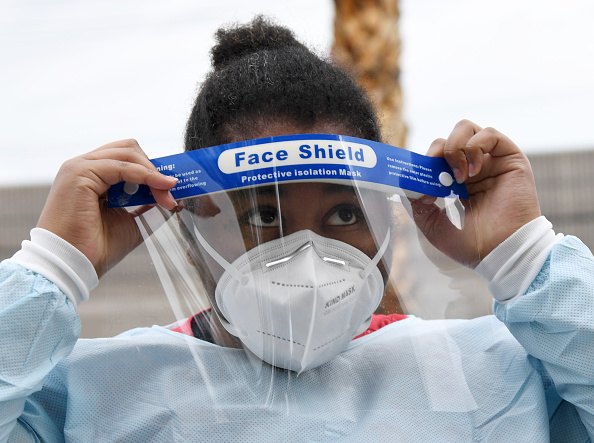
Certified medical assistant Lakietha Flournoy puts on personal protective equipment as she gets ready to conduct tests for COVID-19 at a drive-up testing station in the parking lot of UNLV Medicine on April 6.
During his shift in the emergency department of Massachusetts General Hospital, Dr. Shuhan He dons standard protective equipment. At this point, everyone wears it, “because you just don’t know if someone has Covid-19.”
When intubating a patient, He wears much more equipment: goggles, a face shield, two masks, a body gown, and another gown around his neck.
The N95 mask He wears fits tight, to the point that it can leave scars after wearing it for an extended period of time. But it’s also critically important — it filters out most airborne particles, protecting him from the virus.
“I worked yesterday and 100% of my patients were Covid,” He said in a phone interview on Saturday. “They’re getting quite sick.”
Unfortunately, many healthcare facilities across the U.S. face a shortage of PPE, as a sudden uptick in demand pits hospitals and states against each other in a bidding war for equipment.
To help offset that, He and a group of emergency physicians co-founded #GetUsPPE, a site to match available resources to healthcare workers. It was a spinoff of his past work with MGH’s Center for Innovation and Digital Healthcare. Named after #GetMePPE, an outcry by healthcare workers to highlight the shortage of protective equipment, the site has taken in more than 1,975 requests for donations.

A Deep-dive Into Specialty Pharma
A specialty drug is a class of prescription medications used to treat complex, chronic or rare medical conditions. Although this classification was originally intended to define the treatment of rare, also termed “orphan” diseases, affecting fewer than 200,000 people in the US, more recently, specialty drugs have emerged as the cornerstone of treatment for chronic and complex diseases such as cancer, autoimmune conditions, diabetes, hepatitis C, and HIV/AIDS.
“As an ER doctor, personally, I see (our facility) as quite prepared. We’re one of the most well-resourced places,” he said. “But with GetUsPPE, I see horrible shortages of PPE nationally, and horrible inequities in that shortage.”
A report released Monday by Department of Health and Human Services Office of Inspector General shows the scope of the problem. The survey of more than 300 hospitals shared anecdotes of facilities that were struggling to keep up with equipment needs.
Part of it is due to the sheer amount of PPE that hospitals require to handle an outbreak. One hospital reported that it had previously used 200 masks per day; now, it uses 2,000. Others have faced long wait times and skyrocketing prices from distributors, with masks that once cost 50 cents now costing $6 each.
The lack of PPE has pushed hospitals to creative means. Some hospitals are reserving N95 masks solely for higher-risk procedures, such an intubation. Others are reusing masks, by using ultra-violet sterilization or by wearing another mask over their N95.
One hospital used 3-D printing to manufacture masks, and another said its staff had made 500 face shields using office supplies. They’ve also turned to new sources of PPE, including home supply stores, autobody supply shops and beauty salons.
He first became aware of the problem after seeing several discussions about PPE in a Facebook group about medical supplies. Around mid-March, he saw dozens of spreadsheets being shared.
“In Covid-19 there’s a curve of patients. At one point in this peak, everyone realizes they’re running out of PPE,” he said. “We’re trying to look at areas that have a lot of PPE usage but not a lot of Covid-19 cases, and the inverse as well.”
A good mask is hard to find
Of all the requests on #GetUsPPE, the vast majority are for N95 masks.
“This is a really complex problem,” He said. “PPE is not one single supply. You’re talking about 20 different things. Depending on the type of the mask, it’s really easy to make. An N95 mask is actually really hard to make.”
Surgical masks and face shields are relatively simple to manufacture. N95 masks, on the other hand, rely on a complicated supply chain. On top of that, large health systems have pre-vetted suppliers that they prefer to work with. And, of course, the masks have to fit.
“They need uniformity and the ability to test it,” He said. “They can’t just buy from new players in the market.”
He thinks about the matching process like a dating game. Different facilities have different qualities that they’re looking for in PPE. Some hospitals may only be able to accept new, unopened equipment, while other facilities might be able to accept used PPE.
Smaller facilities, such as nursing homes and community health clinics, are in an especially tight spot, since they often don’t have leverage to barter with distributors. But they often get overlooked.
“Everyone’s kind of missing that they should be selling to smaller places,” He said. “But they’re small. They’re hard to find. In a lot of ways to me this is a mixing and matching problem”
The shortage has divided facilities into the haves and the have-nots. But healthcare workers who still have access to adequate PPE will be affected by those who don’t.
“If a nursing home around Boston doesn’t have PPE, they make more patients and then I end up seeing them,” He said. “You can be as prepared as you want behind this iron wall. It’s a disease of inequity. … This is fundamentally a pandemic and pandemics are global problems.”
Photo credit: Ethan Miller, Getty Images













